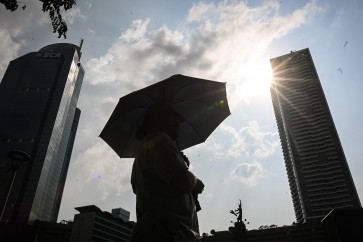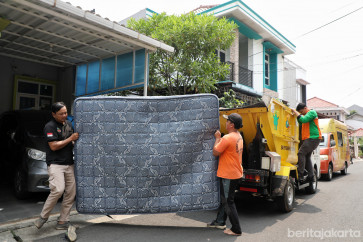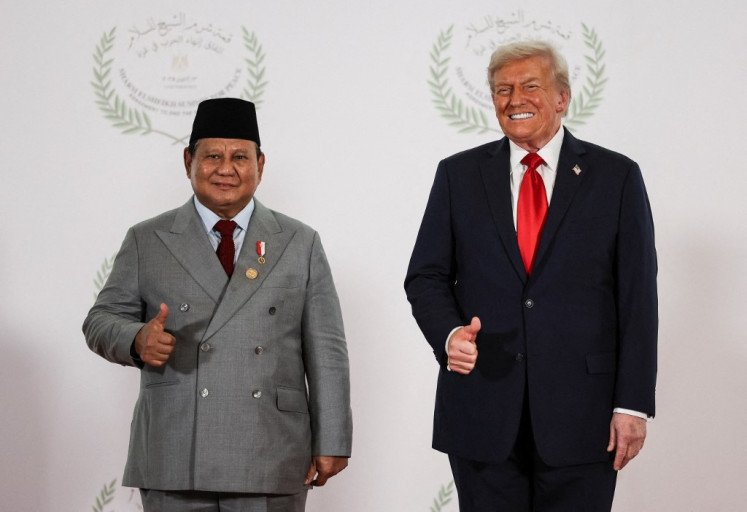Popular Reads
Top Results
Can't find what you're looking for?
View all search resultsPopular Reads
Top Results
Can't find what you're looking for?
View all search resultsIndonesia secures vaccine sources amid fiercer competition
Change text size
Gift Premium Articles
to Anyone
I
ndonesia has secured enough buy-ins from its partners to provide a steady supply of COVID-19 vaccines for its procurement pipeline, Health Minister Budi Gunadi Sadikin said on Monday, as global competition over the jabs heats up and the gap between rich and poor nations deepens.
Speaking at the vaccination of creative industry workers at the National Gallery in Jakarta, Budi gave an assurance that the country would have enough options to continue its vaccination drive even if global shortages get worse.
“Now the struggle to get vaccines is truly getting fierce all over the world. Thank God that Indonesia has four sources [to choose from],” he said at the public service event, broadcast live by the Presidential Secretariat.
The nation currently sources its vaccine jabs from several producers, including Chinese pharmaceuticals company Sinovac Biotech, Anglo-Swedish drug company AstraZeneca, United States drug developer Novavax and Pfizer-BioNTech, a US-German collaboration.
In the event of disrupted supplies from one manufacturer, the minister insists Indonesia would still be able to rely on the others. The country had hoped to diversify its vaccine supplies, but so far it could only rely on Sinovac.
“The smoothest delivery is from China; they routinely send a shipment every two weeks,” Budi said.
On Sunday, Indonesia received 6 million doses of bulk material for vaccines that will be processed into 4.8 doses set to be distributed in May, he said. The shipment was part of the 140 million bulk vaccines that Indonesia will receive this year from Sinovac.
"Even though we are now slowing down our vaccinations because of AstraZeneca’s availability issues, we are glad that vaccines are still coming from China,” Budi said.
The minister previously said a number of factors, such as outbreaks in vaccine-producing countries, have affected global vaccine supplies, most recently in India. Additionally, embargo policies in the United States and United Kingdom have also complicated the situation.
“Because of the spike in cases in India, India wants to ensure and prioritize production for domestic needs. The same situation also arose in the US and UK,” he said in a webinar on Sunday.
The global COVID-19 death toll passed 3 million on Saturday as the pandemic sped up despite vaccination campaigns, leading countries to impose new lockdowns to fight spiraling infection numbers.
The World Health Organization has warned that infections are approaching the highest rates since it declared the outbreak a pandemic in March last year.
It notes that some countries that had previously managed to avoid widespread transmission are now witnessing significant increases in the number of infections.
Indonesia's eastern neighbor Papua New Guinea, with its population of around 8 million, for instance, saw a jump in new COVID-19 cases from about 900 cases and nine deaths to 9,300 cases and 82 deaths.
WHO chief Tedros Adhanom Ghebreyesus said that such “steep increases” were a perfect example of why vaccine equity was very important, as discrepancies in vaccine distribution became very apparent between wealthy and poor nations.
At a GAVI-COVAX Facility meeting on Thursday to raise funds to meet global needs, Foreign Minister Retno LP Marsudi laid out the bare truth that nearly one in four people in high-income countries had been vaccinated, compared to the only one in 500 people in low-income countries.
“All countries must unite against hoarding and vaccine nationalism. The politicization of vaccines must also be eliminated, because it can lead to geopolitical divisions,” Retno said in a statement issued on Friday.
COVAX is a WHO-backed effort to procure and distribute 1.8 billion doses of vaccine to poor countries.
Besides the Sinovac vaccines, Indonesia received 1.1 million doses of the AstraZeneca jab last month through the COVAX facility.
So far, the global mechanism has managed to deliver 38 million vaccines to 100 countries on six continents. However, there are still challenges of access and distribution, with only 0.2 percent of the vaccines being distributed to low-income countries.
Indonesia is currently expecting 10 million more doses from the facility, but the supplies are bound to be delayed as the vaccine is manufactured by the Serum Institute of India (SII), which is prioritizing India’s domestic needs.
After earlier success in controlling the outbreaks, India faces a massive second wave of COVID-19 infections surpassing the US and Brazil with more than 270,000 daily infections as of Sunday.
India has vaccinated 122.6 million people, about 7 percent of its population, according to Worldometer, while Indonesia has so far vaccinated 16.7 million people, about 4 percent of its population.
Meanwhile, the UK and the US are miles ahead; some 42 million people in the UK, 48 percent of its population, have been vaccinated, while more than 205 million Americans (38 percent) have been inoculated.










